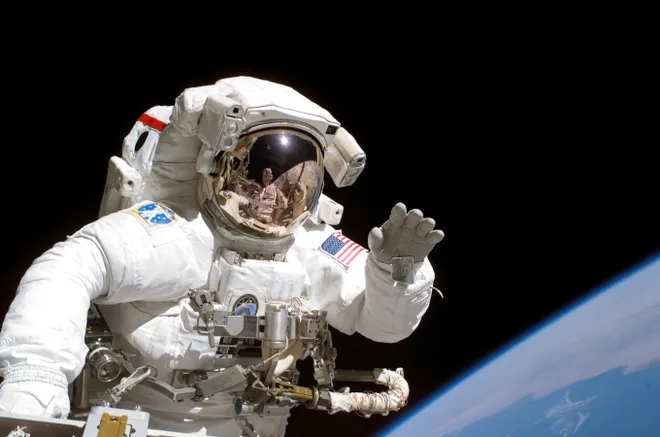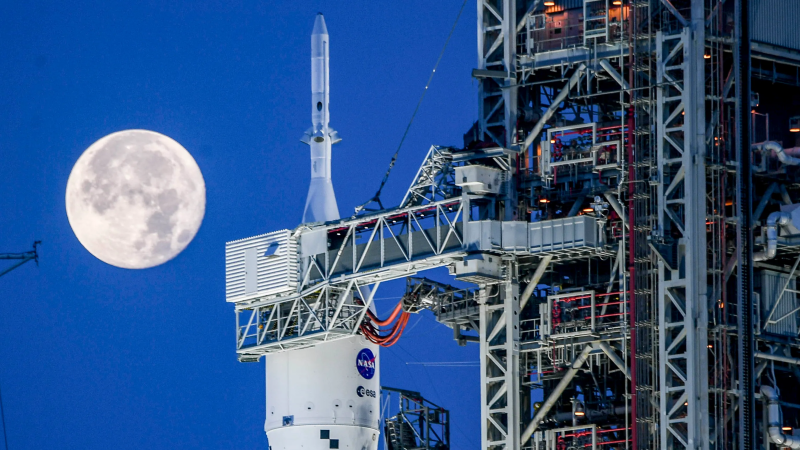New spacesuit is 'Dune'-inspired and could recycle urine into water
A spacesuit capable of absorbing moisture and recycling it into drinking water sounds like the stuff of science fiction. But a new study could bring it one step closer to reality.
A team of researchers has designed a spacesuit that would collect urine and filter it into drinkable water – inspired by the "stillsuits" of the science fiction franchise "Dune."
"I felt like it was kind of ridiculous that we hadn't made a stillsuit yet," said Sofia Etlin, the lead author of the study and a staff researcher at Weill Cornell Medicine.
Etlin told USA TODAY she got the idea from Frank Herbert's original "Dune" book series, in which the natives of the desert planet Arrakis wear suits that absorb urine and sweat to preserve their bodies' natural moisture.
The research team's new design for a spacesuit, outlined in an article published last Thursday in the journal Frontiers in Space Technology, aims to collect 85% of an astronaut's urine and filter it into drinkable water, all while they float through space.
The suit, worn while an astronaut is on a "spacewalk" or outside the ship, consists of three parts – "a piece that collects the urine, a piece that filtrates it, and the piece where that water is collected for astronauts to be able to drink it once more," Etlin said.
The team designed the new suits out of a flexible material lined with antimicrobial fabric, according to the study. Urine would collect through an "external catheter system" and flow into a silicon cup fitted with humidity sensors that can detect when liquid enters.
Then, a filtration system would convert it into potable water through forward and reverse osmosis, the study's authors wrote. The filter would keep salt levels low and pull out compounds found in urine like urea, uric acid, ammonia, and calcium.
While the new suit would help astronauts while they are on a spacewalk, the International Space Station is already equipped with a system that collects wastewater and processes it into drinkable water, according to NASA.

More:Starliner astronauts are 'not complaining' about longer stay in space
Astronauts complain of leaks, discomfort with current system
The filtration system that astronauts currently use in space is far from ideal, Etlin said.
Known as the "extravehicular mobility unit," or EMU, the system dates back to the ’70s, she said.
The first system in use was a catheter shaped like a condom, Etlin explained. Once the first women went to space, astronauts started to use a disposable diaper called a maximum absorbency garment.
The diaper uses a "highly absorbent polymer compound" to absorb urine and convert it into gel, according to NASA. A technical brief released by NASA last year said astronauts complained that the urine collection device is uncomfortable, causes skin irritation and often leaks.
Keeping waste close to the body for so long can also put astronauts at risk of medical issues like urinary tract infections and gastrointestinal distress, according to the study.
"It's like an 'I can't tell urine from sweat anymore' sort of situation," Etlin said. "In their moments of the most physical exertion, they'll have at any point in time during a space flight, they're wearing diapers."
Astronauts also said bad smells escaping from the feces collection system also caused them to lose their appetite, according to the brief. The bag “doesn’t stick to your butt well,” causing the occasional "complete mess,” according to the brief.
Sometimes, astronauts even eat and drink less in the days before a spacewalk to avoid using the current system, the study's authors wrote. But that can sap an astronaut's energy levels for a long spacewalk.
Spacewalks are especially hard physical work, causing astronauts to sweat profusely and increase the risk of dehydration, according to the study. Astronauts also have to go more frequently in space – gravitational changes cause their water levels to drop by up to 3%, causing them to urinate more.
And that's in addition to the heavy toll that floating in space takes on the human body. "Astronauts are in a situation where, in microgravity, you're slowly sort of losing muscle mass," Etlin said.
Astronauts exercise heavily to counteract the effects, "but it's never enough," Etlin said. "They always come back sort of weaker and weaker the longer they spend up there."
An astronaut's water supply bag – currently, less than a liter – is also not enough to stay hydrated through longer spacewalks, the study said.
"Now you're on the moon, and you're out on your rover, and you're x kilometers away from your base, and you have a breakdown, and now what? Now you barely have any water to drink," said Etlin. "These are scenarios that astronauts have thought of and have worried about when it comes to the amount of water they have."
More:Crewed Boeing Starliner finally launches from Florida: 'Let's put some fire in this rocket'
New spacesuits won't go into use for several years
With several missions to space on the horizon, new technology to support space travel is in the works. NASA plans to send astronauts into the moon's orbit in the fall of 2025 and hopes to touchdown two astronauts on the moon's surface a year later.
Etlin said the new suits likely wouldn't go into use until 2026. Her team just received approval to carry out a clinical test of the catheter part of the suit this fall. "Seeing things be put into space is so difficult, even in terms of costs for the testing of it," she said.

Still, she's glad her project is happening at a time when interest in space travel is heating up.
"The industry is at a precipice," she said. "If I had had this idea two years ago, there wouldn't even be a conversation because no new spacesuits were being developed."
Cybele Mayes-Osterman is a breaking news reporter for USA Today. Reach her by email at cmayesosterman@usatoday.com. Follow her on X @CybeleMO.
Disclaimer: The copyright of this article belongs to the original author. Reposting this article is solely for the purpose of information dissemination and does not constitute any investment advice. If there is any infringement, please contact us immediately. We will make corrections or deletions as necessary. Thank you.




